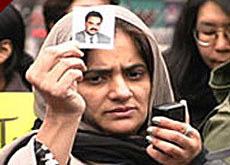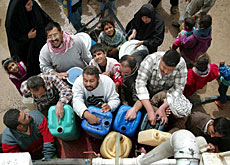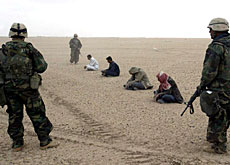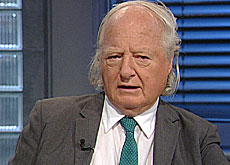Human rights take centre stage in Geneva

Switzerland's first International Film Festival on Human Rights kicks off in Geneva on Friday, against the backdrop of a week-old war in Iraq.
The event aims to raise public awareness of human rights violations around the world, including the Middle East.
According to the organisers, films and documentaries provide an evocative and effective means of exploring issues such as conflict, globalisation, state violence and freedom of expression.
Making a difference
“The festival is about educating young people and mobilising everybody and making them realise that they can make a difference in their home countries and across the world,” said Loubna Freih, the Geneva Director of Human Rights Watch – one of the organisations taking part in the event.
“It’s also important that it’s taking place in Geneva because the city serves as the custodian of international humanitarian law and the Geneva Conventions,” she added.
A broad range of international works has been selected for the festival – from portrayals of injustice in India to accounts of atrocities in the Balkans – although much of the attention is expected to focus on the war in Iraq.
Iraq
One of the films, entitled “Generation of Hate”, chronicles the lives of young Iraqis, who are torn between lashing out at an America they have never seen and a dictator they know all too well.
It portrays a 15-year-old boy named Hamil, who still has shell fragments in his skull, left over from the United States’ first attempt to oust Saddam in 1991. He rages against the US and their invasion, but also about Saddam Hussein and his regime.
The screening of the film will be followed by a debate – between supporters and opponents of the war – on the role and responsibility of the international community towards Iraq.
Understanding
Rui Nogueira, a Geneva-based filmmaker who helped select the film, believes it will encourage the public to confront and understand what the Iraqi people have been experiencing for decades – from ongoing wars to internal hardship, as well as the effects of international sanctions.
“It can be used to help us reflect on the world’s problems,” he told swissinfo. “Film is not a weapon for peace or for war… but it is does provide a way to help the world to become better, if that’s possible.”
Besides Human Rights Watch, other sponsors of the event include the Geneva-based International Committee of the Red Cross, the United Nations High Commissioner for Human Rights, the World Organization Against Torture and the University of Geneva.
The event was originally organised to coincide with the annual meeting of the UN’s top human rights body, which is currently taking place in Geneva, but the sponsors say it is even more pertinent now because of the attack on Iraq.
“We could not have envisaged that the festival would coincide with the war in Iraq, nor the chasm between the international community, which has rarely been seen before,” said Freih. “It’s a trying time for everybody.”
Civil liberties
Another film being shown during the festival is “Brothers and Others”, which takes an in-depth look at the treatment of Arabs in America since the terrorist attacks of September 11.
Directed by the Swiss-born filmmaker, Nicolas Rossier, the story brings together testimonies from Muslim men and women in the US, whose family members were arrested in the aftermath of the attacks.
“It shows how these men were arbitrarily arrested and held incommunicado… Some of them had lived in the US for 15 years and they thought New York was the place they could be free,” said Freih.
“It demonstrates how much things have changed in the US, in the space of just a little over a year,” she added.
Panel discussion
Again, a panel discussion will follow the screening, during which humanitarian experts have been asked to examine whether international humanitarian law, refugee law and human rights are being violated and even forgotten in the fight against terror.
“We have moved into security mode and there has been an erosion of individual rights since September 11,” said Freih. “I think it is important that we realise that this is happening right here, right next door and that it could happen to everybody.”
“Bloody Sunday”
The Geneva event will also see the Swiss premiere of “Bloody Sunday”, which won the Golden Bear award at last year’s international film festival in Berlin.
The documentary-drama – directed by Britain’s Paul Greengrass – revisits the events of January 30, 1972, when British paratroopers opened fire on a peace march in Londonderry, Northern Ireland, killing 13 civilians.
Even though the subject matter is more than 30 years old, the film highlights issues that are still topical today, such as whether it is possible to cope with injustice without resorting to violence, fear and hatred.
It also questions the roles of government and civil society in shaping history and memory.
In addition to these films, the festival features an array of other human rights-related works, including a disturbing look at how rape was used as a weapon during the Bosnian-Serbian war.
Several of the documentaries and dramas have been selected for the festival’s international competition, which will award prizes to the two filmmakers who best demonstrate their commitment to human rights.
swissinfo, Anna Nelson in Geneva
Switzerland’s first International Human Rights Film Festival runs from March 28 to April 3 in Geneva.
It was organised by various non-governmental and humanitarian organisations to coincide with the annual meeting of the United Nations Human Rights Commission.
The aim of the event is to raise public awareness of human rights abuses through film and discussion.
Switzerland is the depository state of the Geneva Conventions, which outline rules of conduct during times of war and form the backbone of international humanitarian law.

In compliance with the JTI standards
More: SWI swissinfo.ch certified by the Journalism Trust Initiative



You can find an overview of ongoing debates with our journalists here . Please join us!
If you want to start a conversation about a topic raised in this article or want to report factual errors, email us at english@swissinfo.ch.